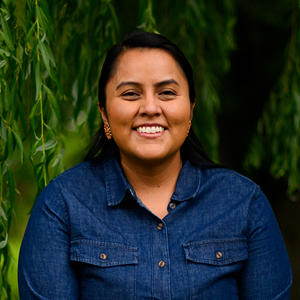Danya Carroll is a postdoctoral associate in epidemiology and biostatistics at Schulich Medicine & Dentistry. She is working with Nicole Redvers, professor and director of Indigenous Planetary Health, to explore the intersection of Indigenous knowledge, public health and environmental policy.

Danya Carroll
A member of the Navajo Nation and the White Mountain Apache Tribe, Carroll completed one of North America's first doctoral programs in Indigenous health and is part of a growing movement to prioritize Indigenous-led research and self-determined health systems.
In conversation with Schulich Communications, she shares insights from her work, the critical need to protect both Indigenous knowledge and land and how to move forward.
What shaped your interest in Indigenous health and knowledge systems?
DC: A lot of it goes back to first-hand experience with my communities. I've been fortunate to work directly with both the Navajo and White Mountain Apache Nations, particularly around food sovereignty - supporting our communities to rebuild our food systems and reconnect with traditional foods. That work opened my eyes to how deeply tied our health is to land, culture and knowledge.
I was part of the first graduating cohort in the Indigenous Health PhD program at the University of North Dakota. It came along at the right time, during the pandemic, and was grounded in Indigenous perspectives. It was a game changer for me to learn from Indigenous faculty and be in a space where our worldviews were centered.
Your recent work looks at Indigenous knowledge and climate change, especially in relation to policy. Why is that intersection important?
DC: Climate change is one of the biggest issues of our generation, and it's a direct threat to Indigenous Peoples, our lands and our knowledges. The knowledges we hold are land-based. If the land isn't healthy, we cannot be healthy.
We're at a critical point in time, as the planet continues to warm and we continue to see the devastating impact of wildfires and extreme weather. How are we going to change our path? Part of that is critically engaging Indigenous communities on different solutions. As Dr. Redvers and others have shared, we can't address these problems from the same mindset that created them.
In our recent paper, we looked at how Indigenous knowledge is, or isn't, reflected in climate policy across Canada and the U.S. There's a lot of research out there, but policy inclusion still lags. We proposed that instead of just integrating fragments of Indigenous knowledge into existing frameworks, policy needs to centre Indigenous worldviews and values.
That idea - that Indigenous knowledge can't simply be "plugged in" to Westernized systems - is a powerful one. What does meaningful engagement look like to you?
DC: For one, Indigenous Peoples need to lead the research and policy development that affects them. That's the gold standard. I'm part of a CIHR-funded, Indigenous-led research team at Western working with a local Indigenous health organization on a traditional foods program. It's a great example of what respectful collaboration can look like and how research can respond to community needs.
It also means creating ethical spaces for dialogue. That's something our work emphasizes: the need for truly cooperative, not competitive, relationships between Indigenous and Western knowledge systems.
Meaningful engagement also means respecting the rights of Indigenous communities to control how - and whether - their knowledge is used, as we outlined in a recent review on protecting traditional ecological knowledges in Canada and beyond.
It's about trust, time and reciprocity.
In Canada, land acknowledgements have become more common. But those are considered a starting point in reconciliation. What else is needed?
DC: Action. Acknowledging the land is important, but what happens after that? Are people building relationships with Indigenous communities? Are they supporting Indigenous leadership?
In academia, we're always racing toward deadlines. But building trust takes time. It's about being intentional - getting to know communities, learning their history, showing up consistently.
What gives you hope, especially in a time of overlapping crises - wildfires, warming temperatures and systemic health inequities?
DC: Our resilience. Indigenous Peoples have always been here, and we'll continue to be here. We've withstood so much and still carry forward our knowledges, our languages, our ways of life.
I also see hope in the younger generations. They care deeply about these issues. They know their future depends on the choices we make today. In Indigenous health research, we always think with a long-term perspective. We're asking: What are we leaving behind? Are we doing our part, like our ancestors did, to make sure future generations can thrive?
What would you want non-Indigenous readers to take away from your work?
DC: That collaboration is essential, and that it has to be done with care and intention. Elder Albert Marshall describes this as the "gift of multiple perspectives," which is at the heart of the Two-Eyed Seeing approach. We need diverse worldviews to solve the complex problems we face. That means listening, learning and working as allies - not parachuting into communities, but building relationships that last.
Climate change, health, conservation - it's all connected. Indigenous knowledges have always understood that. If we're serious about solutions, we need to centre the knowledge systems that have sustained life for millennia.






